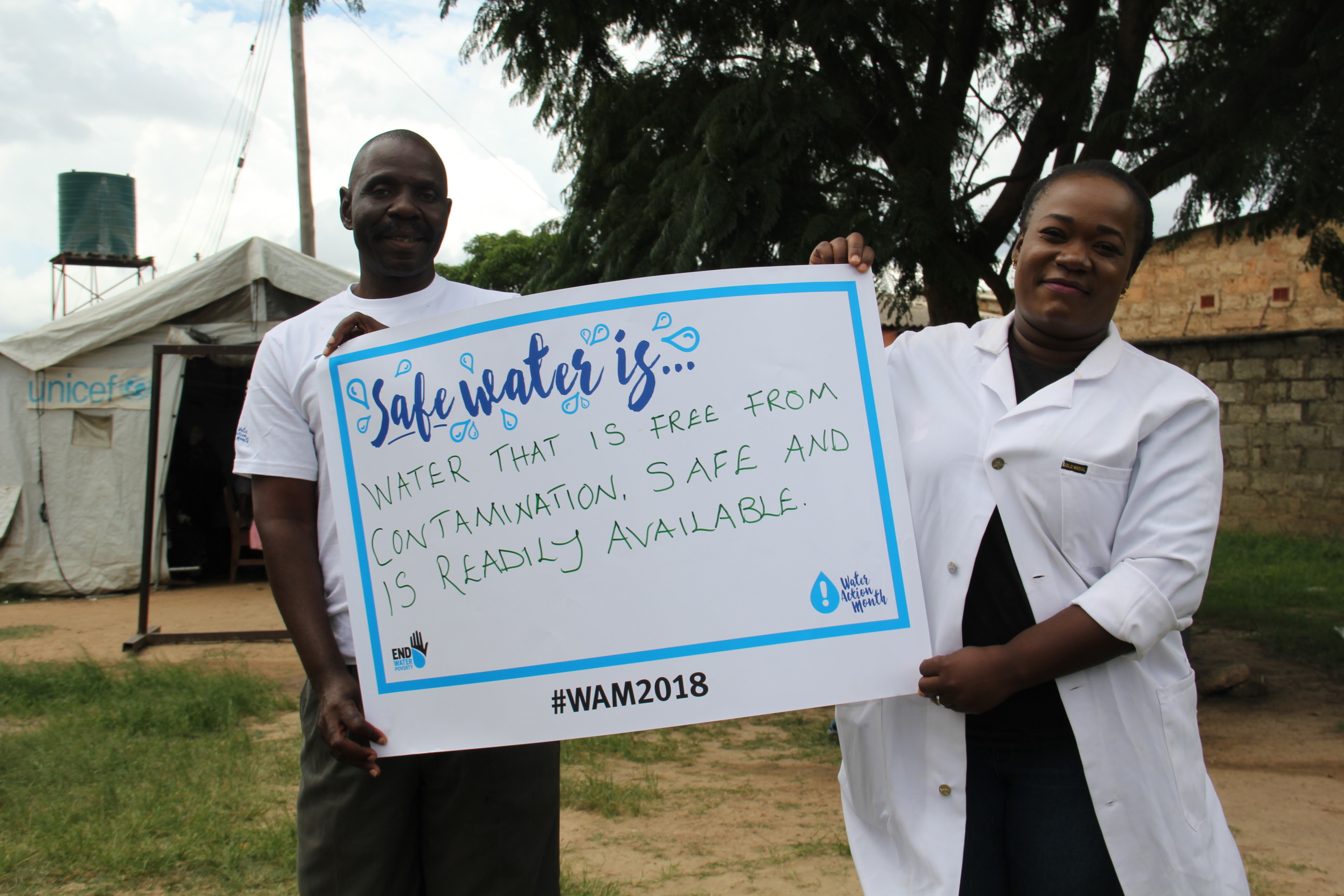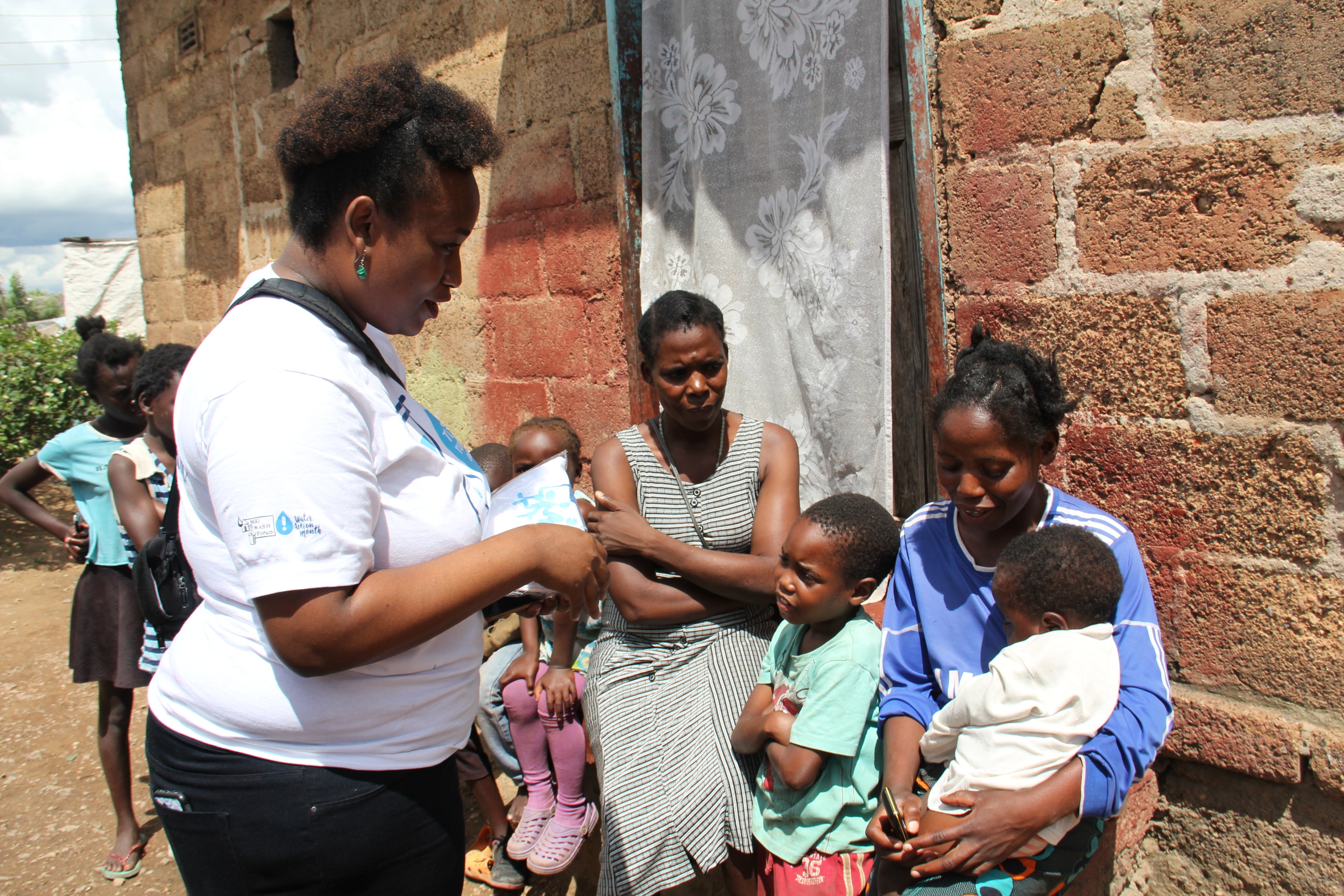Photo: End Water Poverty / NGO WASH Forum / Kiana Alavi
A year has passed since the last cholera outbreak in Zambia, which lasted roughly seven months (October 2017 – May 2018) and resulted in approximately 5,900 cases and 114 deaths. There were numerous causes responsible for this outbreak, such as poor food handling. However, the biggest contributor to this occurrence was the contaminated water from shallow wells of the country’s capital, Lusaka.
This outbreak led to an instant shift of focus from the Government and other actors such as the private sector, health facilities and organisations on providing the necessary support to respond to the crisis. During this period, response efforts included cholera and handwashing training for healthcare workers and teachers as well as a door-to-door campaign in communities such as Chipata to provide hygiene education. Since then, the multi-sectoral and well-coordinated epidemic preparedness committee has been strengthened and will be key in controlling future outbreaks. But is it in Zambia’s interest to only control outbreaks? Won’t it be more economically beneficial to prevent as opposed to controlling them?
It is evident that necessary steps are being taken to ensure that an outbreak does not occur again; or if it does, it will be mitigated to not place such a strain on the economy and healthcare facilities. These changes include an increase (by three-fold) of budget allocated by the Zambian Government towards water, sanitation and hygiene (WASH) services.

Even though the WASH sector has received a generous allocation in the 2019 budget (approximately 29%), these commitments are only half-heartedly executed during budgetary implementation period. In 2018, the sector received less than 30% of the allocated budget. To influence parliamentary debate on the importance of WASH in Zambia and its prioritisation, the NGO WASH Forum appeared before the Expanded Budget Committee on Estimates to share with parliamentarians its analyses of the 2019 national budget; pointing out that WASH is a rights issue that cuts across several sectors. Reaching Sustainable Development Goal 6 (ensure availability and sustainable management of water and sanitation for all) allows us to reach all 17 global goals; and epidemics such as the cholera outbreaks only hinder our progress towards a healthier, brighter and more sustainable future.
Although this increase in budget allocation is a necessary step, there are two main areas of concern:
- Rural populations and communities are left behind as the funding is heavily skewed towards urban WASH projects. Of the impressive budget allocated to WASH, 59 percent is to go towards urban areas, implying a relative marginalisation of rural area water supply and sanitation services.
- Domestic funding for WASH infrastructure spending is less than 21%. The majority is expected to come from loans (75%) and a minimal proportion from grants (3.8%). The largest of the loans being 416 million Kwacha (approximately 35,000 USD) from Standard Chartered Bank.
For the Zambian Government and all other key stakeholders to move forward, these gaps and areas of concern must be addressed. Regular reporting and meetings with those involved and who have a role to play can also create an enabling environment to reach Goal 6. For example, during the AfricaSan, the Government of the Republic of Zambia committed to the Ngor Declaration, which set out, among other things, to focus on the poorest, most marginalised and unserved by progressively eliminating inequalities in access. It committed to using and implementing national and local strategies with an emphasis on equity and sustainability.
In 2014 the Zambian Government along with the Water and Sanitation Sector Cooperating Partners committed to conduct an annual Joint Water Sector Review (JWSR) – now renamed the Joint Water Sanitation and Environment Sector Review (JWSESR) –, a process to take stock of progress, achievements, bottlenecks and weaknesses in Water Supply and Sanitation as well as Water Resource Management. Despite the commitment to reviewing the sector on an annual basis, prior to the 2018 meeting, the previous JSWR took place in 2014 with no further meetings in between. The most glaring challenge has been the fact that the Ministry did not institutionalise the JWSR processes.
At the recent JWSESR in 2018, the sector agreed to have the review every two years and a minor review that will fit into the overall process. The NGO WASH Forum will be having a series of meetings to discuss advocacy strategies on how to track these key actions in the matrix document of the 2017/2018 JWSESR. Additionally, the Forum will conduct an analysis on why the Government has not taken ownership of the JWSESR. For the NGO WASH Forum, the next steps include a political and economic analysis of the last JWSESR process for 2014 and 2017/2018, from which an analytical report will be produced and shared.

That said, it’s not just the Government’s responsibility to tackle this issue. Every stakeholder has a key role to play, including community members. We as individuals have the right to safely managed water and sanitation as well as basic hygiene services; but it’s also up to us to use them appropriately. For example, boiling water, using chlorine and washing our hands with soap saves lives and improves our health and wellbeing. Alongside this, strong national accountability mechanisms are needed to reach the SDGs by 2030. According to the 2017 Joint Monitoring Programme Report, over 6 million people lack access to basic water in Zambia (with over 11 million lacking basic sanitation). The report did not include data on safely managed services which is a fundamental human right. Regular reporting on progress will not only hold governments accountable to their promises, but also helps prevent regression and future outbreaks.
NGO WASH Forum (End Water Poverty’s member) has been heavily involved in advocating for an increase in WASH financing and strengthening of accountability mechanisms in Zambia. As part of their efforts they have provided some of the following recommendations:
- Prevention of water and sanitation related diseases should be prioritised for areas identified as epicentres as opposed to investing in emergency response.
- The budget must emphasise performance management and the achievement of outputs to ensure the right to water and sanitation is enjoyed. This means that there is need for a legislative/legal mechanism for protecting the WASH sector from underfunding once funds are allocated in the national budget.
- The funds that have been borrowed to finance the sector is likely to be repaid by the taxpayer. Therefore transparency and accountability of the use of these funds is crucial.
- More domestic resources need to be mobilised and allocated towards the Rural Water Supply and Sanitation Programme, where a large proportion of the population live and many of the WASH needs are.
- Establish a specific budget line for hygiene in line with the eThekwini and Ngor Declarations which requires that a minimum of 0.5 per cent of the GDP be allocated.
- The budget allocations for water, sanitation and hygiene should be subdivided into separate components to allow for better tracking and monitoring
- A financing framework must be developed based on evidence and needs to justify the allocation of funds.
To find out more about the NGO WASH Forum’s work visit their Twitter or Facebook page.